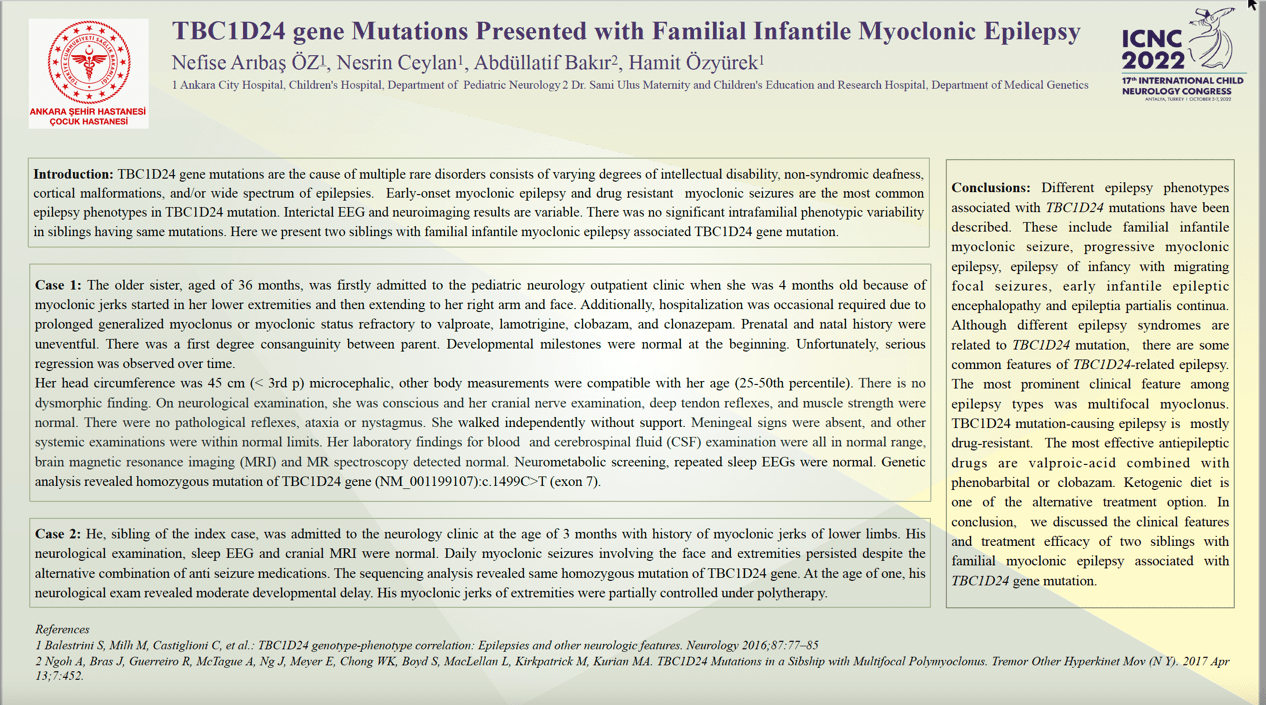TBC1D24 gene Mutations Presented with Familial Infantile Myoclonic Epilepsy
Nefise Arıbaş Öz, Nesrin Ceylan, Abdüllatif Bakır, Hamit Özyürek
Introduction: TBC1D24 gene mutations are the cause of multiple rare disorders consists of varying degrees of intellectual disability, non-syndromic deafness, cortical malformations, and epileptic syndromes. Here we present two siblings with familial infantile myoclonic epilepsy associated TBC1D24 gene mutation. Case 1: The older sister, aged of 36 months, was firstly admitted to the pediatric neurology outpatient clinic when she was 4 months old because of myoclonic jerks started in her lower extremities and then extending to her right arm and face. Additionally, hospitalization was occasional required due to prolonged generalized myoclonus or myoclonic status refractory to valproate, lamotrigine, clobazam, and clonazepam. Prenatal and natal history were uneventful. There was a first degree consanguinity. Developmental milestones were normal at the beginning. Unfortunately, serious regression was observed over time. Neurometabolic screening, repeated sleep EEGs, cranial MRI were normal. Genetic analysis revealed homozygous mutation of TBC1D24 gene (NM_001199107):c.1499C>T (exon 7). Case 2: He, sibling of the index case, was admitted to the neurology clinic at the age of 3 months with history of myoclonic jerks of lower limbs. His neurological examination, sleep EEG and cranial MRI were normal. Daily myoclonic seizures involving the face and extremities persisted despite the alternative combination of antiepileptic drug. The sequencing analysis revealed same homozygous mutation of TBC1D24. At the age of one, his neurological exam revealed moderate developmental delay. His myoclonic jerks of extremities were partially controlled under polytherapy. Conclusion: We reviewed the the literature of clinical spectrum of TBC1D24 mutation in the light of our cases.
Keywords: TBC1D24 gene, Familial Infantile Myoclonic Epilepsy, sibling, pediatric, genetics
Nefise Arıbaş Öz
Ankara City Hospital, Children's Hospital, Pediatric Neurology
Turkey
Nesrin Ceylan
Ankara City Hospital, Children's Hospital, Pediatric Neurology
Turkey
Abdüllatif Bakır
Dr. Sami Ulus Maternity and Children's Education and Research Hospital
Turkey
Hamit Özyürek
Ankara City Hospital, Children's Hospital, Pediatric Neurology
Turkey
Introduction: TBC1D24 gene mutations are the cause of multiple rare disorders consists of varying degrees of intellectual disability, non-syndromic deafness, cortical malformations, and epileptic syndromes. Here we present two siblings with familial infantile myoclonic epilepsy associated TBC1D24 gene mutation. Case 1: The older sister, aged of 36 months, was firstly admitted to the pediatric neurology outpatient clinic when she was 4 months old because of myoclonic jerks started in her lower extremities and then extending to her right arm and face. Additionally, hospitalization was occasional required due to prolonged generalized myoclonus or myoclonic status refractory to valproate, lamotrigine, clobazam, and clonazepam. Prenatal and natal history were uneventful. There was a first degree consanguinity. Developmental milestones were normal at the beginning. Unfortunately, serious regression was observed over time. Neurometabolic screening, repeated sleep EEGs, cranial MRI were normal. Genetic analysis revealed homozygous mutation of TBC1D24 gene (NM_001199107):c.1499C>T (exon 7). Case 2: He, sibling of the index case, was admitted to the neurology clinic at the age of 3 months with history of myoclonic jerks of lower limbs. His neurological examination, sleep EEG and cranial MRI were normal. Daily myoclonic seizures involving the face and extremities persisted despite the alternative combination of antiepileptic drug. The sequencing analysis revealed same homozygous mutation of TBC1D24. At the age of one, his neurological exam revealed moderate developmental delay. His myoclonic jerks of extremities were partially controlled under polytherapy. Conclusion: We reviewed the the literature of clinical spectrum of TBC1D24 mutation in the light of our cases.
Keywords: TBC1D24 gene, Familial Infantile Myoclonic Epilepsy, sibling, pediatric, genetics
Nefise Arıbaş Öz
Ankara City Hospital, Children's Hospital, Pediatric Neurology
Turkey
Nesrin Ceylan
Ankara City Hospital, Children's Hospital, Pediatric Neurology
Turkey
Abdüllatif Bakır
Dr. Sami Ulus Maternity and Children's Education and Research Hospital
Turkey
Hamit Özyürek
Ankara City Hospital, Children's Hospital, Pediatric Neurology
Turkey

Nefise Arıbaş Öz
Ankara City Hospital, Children's Hospital, Pediatric Neurology Turkey
Ankara City Hospital, Children's Hospital, Pediatric Neurology Turkey